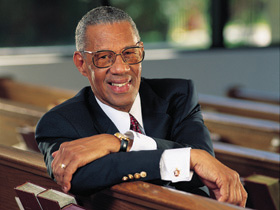 |
|
The Rev. William Lawson joins UH as
Distinguished Community Scholar in Residence.
Photo by Mark Lacy
|
|
Although the Rev. William Lawson retired as pastor of Wheeler
Avenue Baptist Church, he continues to teach messages of hope,
compassion and justice in the lecture rooms of the University
of Houston. In September, Lawson joined the UH faculty as Distinguished
Community Scholar in Residence. He recently spoke to UH Today
about his new position at the university.
Q What are your responsibilities?
A I am coordinating periodic lectures
in the Graduate College of Social Work. The lectures focus on
the theme of the overpopulation of minority men in the criminal
justice system. I have asked the Graduate College of Social
Work to assess the problem and recommend some approaches to
address it. For the first lecture, we brought in Harris County
District Attorney Chuck Rosenthal and two judges, including
Belinda Hill.
Q Why did you select
that subject?
A I am convinced that
the overpopulation of minorities in the criminal justice system
is not because blacks and Hispanics are more criminal. I think
that there is an overbalance in the stereotyping of blacks and
Hispanics. For example, I think that if police were to stop
a group of black teenagers because they think they are a group
of thugs, then they are stereotyping. The same is true with
Hispanics.
Q What are some of changes
you have witnessed in Houston, especially in the Third Ward?
A If you saw or read
about the funeral of Coretta Scott King, you would have heard
or read about a number of changes that have occurred across
the nation since the Civil Rights Movement. The same thing is
true of Houston.
I think that the racial segregation that my wife and I found
when we came here has been badly bruised, if not eliminated.
Two of the most dramatic changes that have occurred were the
election of a woman mayor (Kathy Whitmire) and an African-American
mayor (Lee Brown).
Additionally, Houston has become a major metropolitan area,
a major commerce area and a major banking center.
Q You mentioned Coretta
Scott King and the Civil Rights Movement. What are some of the
challenges that the city and nation still face in regards to
civil rights and other social issues?
A We have not erased
poverty. We have not eliminated the poor education of children,
especially in inner cities. We have not provided health care
to all of our citizens. We have not accurately portrayed blacks
and Hispanics. There’s a great deal of things to be done
now just as they were during the days of Martin Luther King
Jr. I don’t know the final answer, but I know that we
must continue to stand up and fight to resolve these problems.
Q What is the role of
universities in solving these issues?
A Universities should
challenge the intellects of students and make them realize the
purpose of education is not simply so they can earn a higher
income. The purpose of education is so that they can improve
the character of their communities and raise the quality of
life. I think it is just as important to develop values and
principles as it is to develop English and math skills.
Q When you speak to
young people about civil rights and other social issues, what
has been their response?
A It is unfortunate,
but there has been a lull in passion to confront such issues.
Many people feel that they have all that they need. ‘I
have a nice house in a suburban neighborhood. I have a good
job in corporate America, and I drive a Mercedes Benz. Well,
there really isn’t much that I need.’ I think one
of the problems is they that haven’t heard the teachings
of Jesus who said that we’re not complete until we’re
concerned about our fellow man. It is unfortunate, but right
now in 2006, there’s not the passion for righteousness
and justice that there was during the Civil Rights Movement.
Editor’s note:
Lawson is the founding pastor of Wheeler Avenue Baptist Church.
In 1996, Lawson and his wife, Audrey, established the William
A. Lawson Institute for Peace and Prosperity, an advocacy agency
for the poor, minorities, women and other excluded people. He
has received numerous awards and tributes, including honorary
doctorates from UH and Texas Southern University and the 2006
Rotary Club of Houston Distinguished Citizen of the Year Award.
Francine Parker
fparker@central.uh.edu
